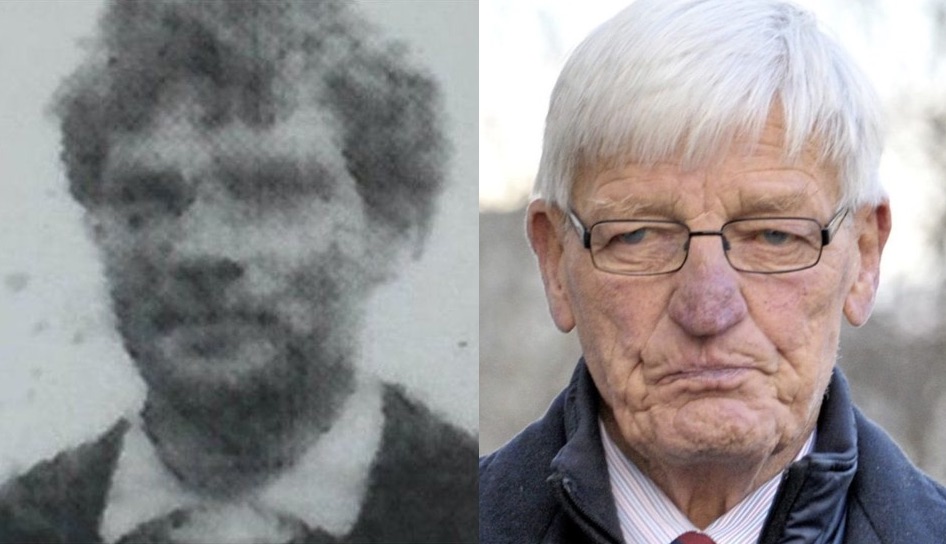
A trial of a British soldier in the north of Ireland has heard evidence that he intentionally shot and killed an innocent and vulnerable man who posed no threat whatsoever.
John Pat Cunningham, was 27 years old when he was shot dead as he ran away from a British Army patrol near Benburb in County Tyrone in 1974.
Dennis Hutchings is currently on trial for the attempted murder of John Pat. He is the first British soldier to be put in the dock for the war crime of killing of a man who was well known to have special needs.
DUP MP Carla Lockhart and a top Tory MP Johnny Mercer were pictured outside Belfast Crown Court on Monday in support of the defendant, who is a high-profile campaigner against the prosecution of war crimes in the north of Ireland.
Hutchings wore a string of British military medals in the dock as the prosecution opened the case against him. A niece and nephew of the victim watched from the public gallery.
John Pat was a vulnerable adult who had a known fear of soldiers and was liable to run from patrols, the court heard.
“John Pat Cunningham did not pose any threat that required that he be shot and killed,” said Crown barrister Charles McCreanor, prosecuting.
Mr McCreanor said that Hutchings had disregarded the British Army’s own instructions for using lethal force when he opened fire with his high velocity rifle, as Mr Cunningham ran away from him across a field.
He told the judge that five shots were fired at Mr Cunningham – three from Hutchings’ rifle and two from the rifle of another soldier.
The barrister said Mr Cunningham was struck by two or three bullets – the fatal shot entering through his back – but that, as none of the five discharged rounds had been recovered, there was no evidence to prove which soldier had fired the shots that hit him, the reason for Hutchings facing only an attempted murder charge.
Mr McCreanor said John Pat’s doctor had described him as having been born with “incomplete development of the mind”, while a local priest said he had the “mind of a child”.
The barrister said Mr Cunningham would be described in today’s terminology as a “vulnerable adult”.
“Those who knew him were aware of his learning difficulties,” he said.
Mr McCreanor said John Pat had a fear of military patrols and persons in uniform, and became “nervous and anxious” when he came across patrols and was liable to run and hide from them.
The court heard that the 27-year-old was killed after British Army vehicles on patrol came across him on a road in Benburb as they rounded a corner.
The Crown lawyer said Hutchings was in charge of the patrol and was sitting in the passenger seat of the lead Land Rover.
Mr McCreanor said the defendant called on John Pat to halt, and he was “startled and confused”. He then ran across the road and climbed over a gate into a field, and ran for 90 metres before he was chased down. Hutchings would have had a clear perception that John Pat posed no threat when he opened fire, he said.
“The defendant would have had him in his sights for a significant period of time before he shot him,” he said.
The court heard that Hutchings had been interviewed twice about the incident – in 1974 and by officers reinvestigating the case in 2015. The judge was told that the admissibility of the 2015 interview is set to be challenged during the trial.
Mr McCreanor said that in the 1974 interview, Hutchings confirmed he was in charge of the patrol and that he had called on John Pat to halt. However, he said the soldier declined to answer any other questions citing “legal advice” he had received.
The barrister said Hutchings’ actions contravened several of the lethal force deployment rules for the British Army, including using the least force possible and firing the minimal number of shots needed.
Mr McCreanor said Mr Cunningham was “innocent and vulnerable”.
“We submit that there was no lawful basis for him to be shot and this shooting could not be justified,” he said.
He said there was a “compelling case” that Hutchings fired three shots at John Pat from close range and that there is “overwhelming evidence that he intended to kill”.
![[Irish Republican News]](https://republican-news.org/graphics/title_gifs/rn.gif)
![[Irish Republican News]](https://republican-news.org/graphics/title_gifs/harp.gif)

